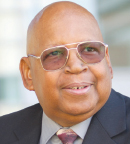
I Reject the Notion I’m on a Cancer Journey - The ASCO Post
I Reject the Notion I’m on a Cancer Journey
My metastatic prostate cancer is just one part of my life’s journey.
I was diagnosed with stage IV prostate cancer in 2002. I had no idea the disease and its treatment would cause me to gain more than 50 pounds and nearly cripple me with pain. I had a transurethral resection of the prostate following my diagnosis and have had multiple testosterone-suppression medications and immunotherapy treatments ever since.
My treatments have allowed me to live with chronic cancer, but I was concerned that my weight could lead to a heart attack or stroke. Plus, the androgen-deprivation therapy was causing such severe loss of muscle mass, I had constant joint and bone pain and needed a walking cane.
At one point, after 12 rounds of docetaxel, a trip from my house to the mailbox and back took herculean effort. I felt if I didn’t do something soon, I might die, not from the cancer but from its aftermath.
Taking Control
As a former athlete, I thought I could devise my ownexercise routine and diet plan, and the weight would fall off. But I
was wrong, and in the process I injured myself. When I sought guidance
from the staff of the exercise oncology laboratory at my hospital about
weight management and physical activity programs, I received no personal
direction. Clearly, I had to take control, but I needed professional
advice on how to lose weight and gain and retain muscle mass safely.
Just waking up every morning and looking into my wife’s eyes is all the quality of life I need.I learned about an exercise physiologist at a cancer center hundreds
— Robert Harrison
of miles from my home. After contacting her, we began strength and
aerobic fitness sessions (via Sykpe and e-mail) that were tailored
specifically to meet my abilities and needs. Through these sessions and
information from a nutritionist at my clinic about healthy food
selection and portion size, I lost 50 pounds and have made significant
gains in muscular strength and mobility. My oncologist said my improved
lifestyle is probably as helpful to maintaining control of my cancer as
the medication he prescribes.
Living a Full Life
Hearing that you have incurable cancer is traumatizing, but I don’t consider myself to be on a cancer journey. There are so many facets to my life that aren’t related to cancer, and they bring me joy. My wife and I have been married for 50 years and have a loving family, which includes our children, grandchildren, and a great-grandchild; our siblings; and wonderful friends. Our lives are full and rich, so I reject the notion I am on a cancer journey. Rather, I am on a life journey, and cancer is an unwanted companion on that journey, but it is just one part of my life. I’ve learned that just being alive carries uncertainty, and there are no guarantees. Cancer may be what ends my life, or it may be a distracted driver on the highway. Until then, I plan to live every day as fully as possible.Engaging the Health-Care System
Since my diagnosis, I’ve become an active patient advocate. My goal is to help health-care providers understand that patients are assets in research conception, design, and utilization. I get angry when I hear patients referred to as “participants” in clinical trials. We do not “participate” in clinical trials; we “contribute” to clinical trials. Patients’ experiences and perspectives are invaluable to making progress in cancer research, and I want to ensure that the research and clinical communities see us as valuable contributors to that progress.I also want to enhance awareness that patients with incurable cancers can and do lead high-quality lives despite our maladies. We accommodate our cancer and its treatment side effects and integrate them into our daily lives. It may not seem possible to do, but it is in ways that are not always quantifiable in research.
Just waking up every morning and looking into my wife’s eyes is all the quality of life I need. ■Mr. Harrison lives in Clayton, North Carolina. He is the founding
President of the Patient and Family Advisory Board at North Carolina Cancer Hospital in Chapel Hill and is a patient advocate for three
university-based cancer research centers.
Related/Background
- Cancer “journey”? … What cancer “journey?” | THE "NEW" PROSTATE CANCER INFOLINK
- I Reject the Notion I'm on a Cancer Journey | Cancer.Net
- Alliance for Clinical Trials in Oncology
- Prostate Cancer Survivor Stories
- Leaders We Respect - American Anti-Cancer Institute
- Strategies to Kill Cancer
- CancerFightingStrategies.com - Home
No comments:
Post a Comment